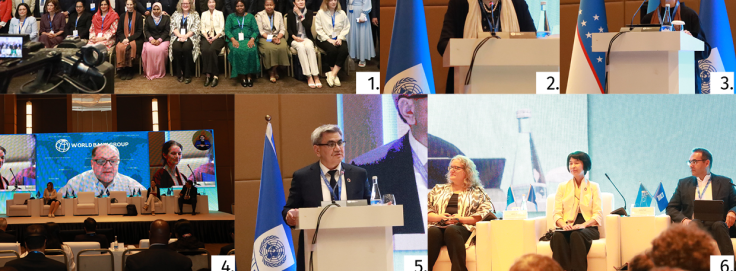
Search
9th MPPN Annual Meeting, Tashkent, Uzbekistan

The 9th MPPN Annual Meeting took place in September 2024 in Tashkent, Uzbekistan, bringing together 160 high-level representatives from 18 countries and 11 organisations.
The three-day event was hosted by the Government of the Republic of Uzbekistan through the Center for Economic Research and Reforms (CERR) under the Administration of the President and was generously supported by UNDP Uzbekistan.
The Meeting provided an opportunity for countries to engage in meaningful dialogue about the insights and challenges of poverty measurement and reduction using the Multidimensional Poverty Index (MPI), while reinforcing the importance of knowledge exchange among policymakers from across the Global South.
Key topics of discussion included poverty alleviation policies, the links between MPIs (such as those focusing on children and elderly populations), the use of MPI in high- and middle-income countries, regional cooperation for poverty reduction, and the role of poverty alleviation in the international sustainable development agenda (including the 2030 Agenda and the Pact for the Future), as well as efforts to eradicate hunger and poverty within the G20 framework.
In the opening session, Ravshan Gulyamov, Advisor to the President of the Republic of Uzbekistan on Economic Development, read out the Address of President Shavkat Mirziyoyev, which concluded with the hope that ‘the practical proposals and recommendations developed as a result will become another step towards reducing poverty throughout the world.’ In his opening remarks, the Director of CERR, Obid Khakimov, encouraged participants to be ambitious and said: ‘We have a unique opportunity to exchange ideas and experiences on such an important topic as multidimensional poverty. We have gathered here to work together on solutions that can change the lives of millions of people around the world.’
On the final day, the CERR, in collaboration with the Agency for Mahallabay Work and Entrepreneurship Development, arranged an informative visit to Konigil village in Samarkand.
There, participants had the opportunity to view community projects that produce paper and vegetable oil under the ‘mahallabay’ system. This integral part of Uzbekistan’s poverty reduction strategy focuses on addressing poverty at the mahalla level, a selfgoverning, community-led form of local government.
The Annual Meeting concluded with the adoption of a four-point Communiqué.
1. Attendees called for the continued use of the MPI to measure poverty and for its integration into policy and planning as a tool for developing high-impact strategies.
2. The importance of prioritising the collection of multidimensional poverty data was emphasised, with a call for improvements to ensure it can better track progress and support evidence-based decision-making.
3. The Communiqué urged countries to report their progress in reducing multidimensional poverty in the Global SDG Indicators Database and through Voluntary National Reviews.
4. The Communiqué called on international actors to recognise and profile global and national Multidimensional Poverty Indices as key measures for understanding trends in poverty at both the global and national levels.
The MPPN will continue fostering peer-learning and dialogue from the South by the South. We reiterate our invitation to all countries and agencies willing to host to contact us.
This article was published in Dimensions 17















